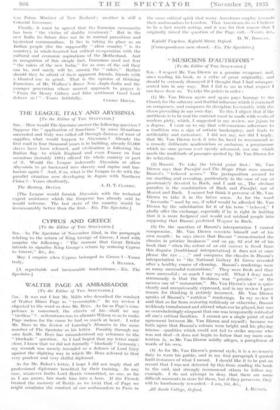" MUSICIENS D'AUTREFOIS "
[To the Editor of Tun SPECTATOR.] S respect Mr. Van Dieren as a genuine composer, and, since reading his book, as a critic of great originality, and should be seriously dismayed if I thought that I had misrepre- ' scnted him in any way. But I fail to see in what respect. I can have done so. To take the points in order :
(1) Mr. Van Dieren again and again pays homage to the. Church for the salutary and fruitful influence which it exercised on composers, and compares its discipline favourably with the chaos prevailing in our own day. To this I object that if the antithesis is to be real the contrast must be made with works of modern piety, which, I suggested in my review, are jejune to a degree. I went on to say that self-conscious adherence to a tradition was a sign of artistic bankruptcy, and leads to artificiality and caricature. I did not say, nor did I imply, that Mr. Van Dieren took it into his head to recommend as a remedy deliberate academicism or archaism, a programme which no sane person ever openly advanced, nor one which. needS the multitude of passages quoted by Mr. Van Dieren for its refutation.
(2) Busoni. To take the trivial point first : Mr. Van Dieren says that Parsifal and The Magic Flute were among Busoni's " beloved scores." The juxtaposition seemed to me startling and revealing, particularly in the case of one so passionately devoted to Bach, and I said so.. The obvious paradox is the combination of Bach and Parsifal, not of Mozart and Bach. I cannot but think it perverse of Mr. Van Dieren to take it in the latter sense. As for the word " favourite " used by me, if relief would be afforded Mr. Van Dieren by the substitution for it of his term " beloved,"• I gladly offer the exchange, especially if he is right in holding that it is more foolproof and would not mislead people into supposing that Busoni preferred Wagner to Bach.
(3) On the question of Busoni's interpretation I cannot compromise. Mr. Van Dieren convicts himself our of his own mouth : he says above that Busoni " reconstructed tbe classics in pristine freshness " and on pp. 82 and 88 of his book that " when the colour of an old canvas is freed from this disguise [traditional interpretation] it does not at once • please the eye ... ." and compares the classics in Busoni's interpretation to " the National Gallery El Greco revealed after a healthy course of cleaning. Busoni's renderings were so many successful restorations." They were fresh and they were successful ; so much I say myself. What I deny most strenuously is that the freshness was " pristine " or the success one of " restoration." Mr. Van Dieren's view is quite clearly and unequivocally expressed, and in my review I gave. reason for thinking it entirely incorrect. Mr. Van Dieren speaks of Busoni's " ruthless " renderings. In my review I said that so far from restoring ruthlessly or otherwise, Busoni recklessly transformed and altered whatever he played, but was so overwhelmingly eloquent that one was temporarily robbed of all one's critical faculties. I cannot see a single point of real agreement between Mr. Van Dieren and myself ; because we both agree that Busoni's colours were bright. and his playing intense—qualities which could not fail to strike anyone who was not deaf—it does not begin to follow that my main con- tention is, as Mr. Van Dieren mildly alleges, a paraphrase of words of his own.'
(4) As for Mr. Van Dieren's general style, it is a reviewer's, duty to warn his public, and in my first paragraph I quoted, lurid instances of what I meant. I should like it to be put on record that I was not deterred by this from reading the book to the end,. and strongly recommend others to follow my. example. I do not attempt to deny that there are some difficult moments in store foi them, but if they persevere, they will be handsomely rewarded.—I am, Sir, &c.,












































 Previous page
Previous page